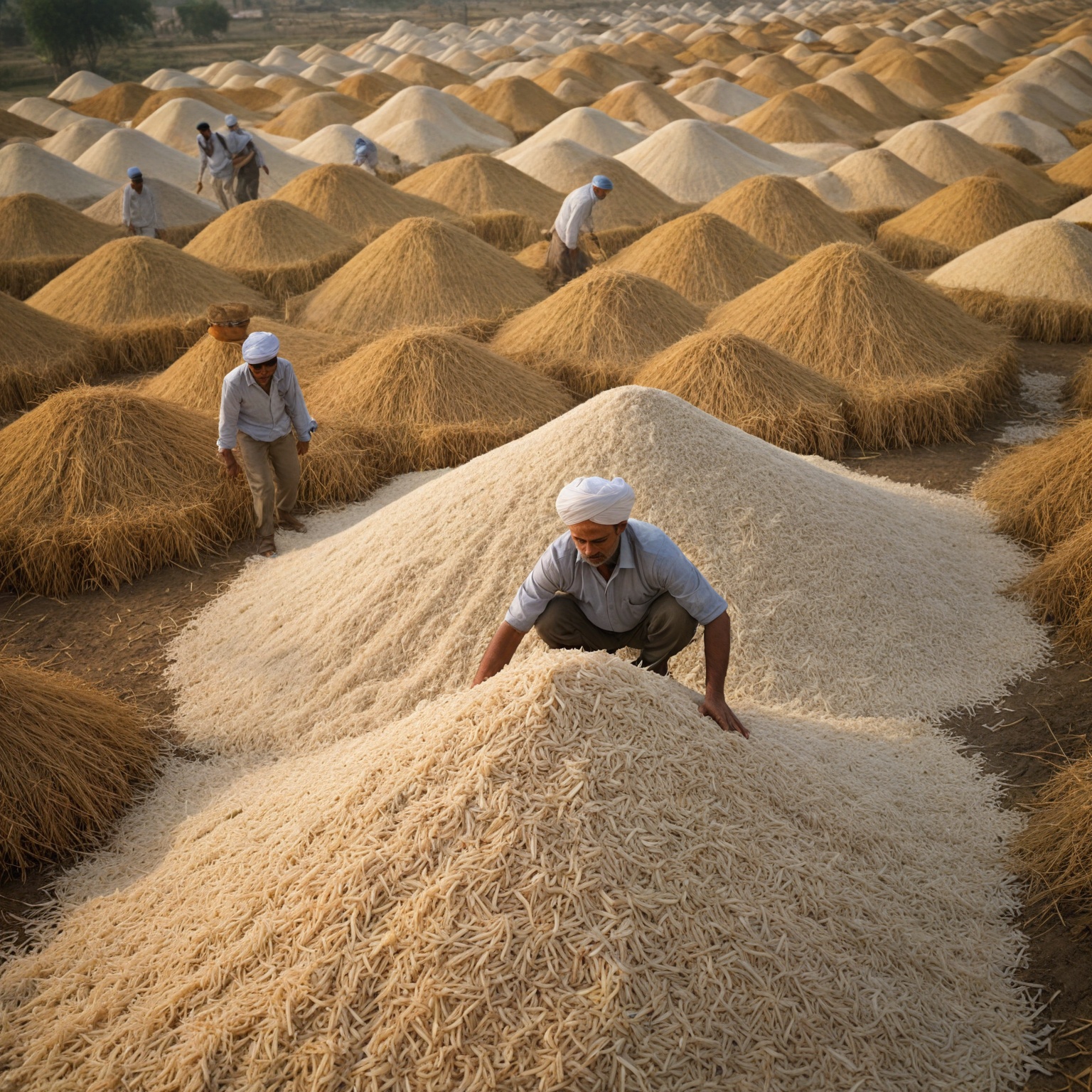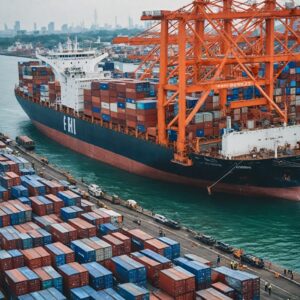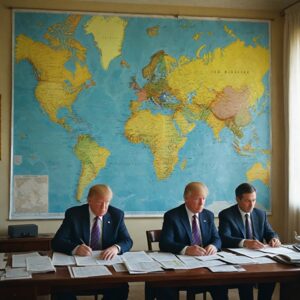Summary
The escalating conflict between Israel and Iran, marked by intensified missile exchanges since October 2024, has significantly disrupted India’s basmati rice exports, with Iran being the third-largest importer of this commodity from India. The tensions have introduced substantial uncertainties in trade relations, causing a sharp decline in demand from Iran and leading to falling prices and export volumes. This disruption not only affects the agricultural economy but also poses broader challenges to India’s strategic trade infrastructure and regional connectivity projects, including the vital Chabahar Port.
India’s complex diplomatic balancing act—maintaining strong defence ties with Israel while preserving crucial economic relations with Iran—has been strained by the conflict’s economic fallout. Exporters face rising shipping costs, insurance complications, and logistical disruptions due to the instability of maritime routes such as the Red Sea and the Strait of Hormuz, which are critical for trade with the Middle East and Europe. These challenges threaten the viability of key trade corridors like the International North-South Transport Corridor (INSTC) and complicate efforts to expand India’s export markets beyond geopolitically sensitive regions.
The conflict’s impact extends to Indian farmers and exporters, who are experiencing declining domestic basmati prices and delayed payments, exacerbating economic pressures amid elevated freight charges and shipping uncertainties. Indian government agencies and industry stakeholders have engaged in ongoing dialogues to mitigate these effects, focusing on diversification of export destinations and seeking alternative trade routes to stabilize supply chains.
This geopolitical crisis underscores India’s delicate position amid competing regional interests and highlights the broader risks posed by the Israel-Iran confrontation to global trade and regional economic stability. Future developments hinge on the trajectory of the conflict, potential shifts in Western sanctions on Iran, and India’s ability to adapt its trade and diplomatic strategies in a volatile environment.
Background
The ongoing conflict between Israel and Iran has intensified sharply in recent times, marked notably by Iran’s missile attack on Israel on October 1, 2024, when approximately 180 missiles were launched, most of which were intercepted or failed to reach their targets. This escalation is not only a regional security concern but also carries significant geopolitical and economic implications, particularly for countries like India that maintain strategic and trade relations with both nations.
India’s diplomatic position is complicated by its deepening defence and security ties with Israel alongside its economic interests in Iran. The instability arising from the Israel-Iran rivalry threatens critical Indian infrastructure projects and trade routes, including the strategic Chabahar Port, which is vital for India’s connectivity with Central Asia and Afghanistan. Moreover, the conflict risks disrupting undersea cable infrastructure crucial for global communications, an issue that has received comparatively less attention amid the focus on military engagements and energy supplies.
On the trade front, Iran is a significant market for Indian exports, particularly basmati rice. In the fiscal year 2024-25, India’s basmati rice exports to Iran were valued at ₹6,374 crores, constituting approximately 12.6% of India’s total basmati exports during this period. Iran ranks as the third-largest importer of Indian basmati rice after Saudi Arabia and Iraq. The ongoing tension has led to concerns about declining demand from Iran, which, coupled with rising uncertainty, is expected to impact prices and export volumes adversely. The broader agri-economy benefits substantially from basmati rice exports, which have grown steadily over the last decade and dominate about 70% of the global market share controlled by India.
In addition, maritime trade routes are affected by the conflict. While conditions in the Red Sea had recently improved, allowing ships to resume regular routes, escalating hostilities raise fears that vessels might have to revert to longer routes around the Cape of Good Hope, increasing transit times and costs. This situation highlights the multifaceted challenges posed by the Israel-Iran conflict to India’s economic interests and strategic autonomy.
Impact of Iran-Israel Tensions on Basmati Rice Trade
The ongoing conflict between Iran and Israel has significantly affected India’s basmati rice exports, with Iran being the third-largest buyer of Indian basmati rice, accounting for approximately 25% of total exports. The geopolitical tensions have introduced substantial uncertainty in trade, leading to a sharp decline in demand from Iran and consequently impacting prices and export volumes.
Basmati rice prices, which had surged by 15-20% due to increased export demand earlier in the year, are now expected to decline as exports to Iran decrease amid the conflict. This slump has been reflected in domestic markets as well, where the price of the popular 1509 basmati variety dropped from Rs 3500 per quintal to Rs 2700 per quintal within a short span, worrying farmers and millers who have scaled back their purchases. Exporters have reported challenges such as higher sea freight costs driven by increased risk premiums and disruptions in key shipping routes, particularly through the Red Sea, Gulf of Oman, and Strait of Hormuz, which are crucial for India’s trade with the Middle East and Europe.
The Red Sea crisis has forced exporters to seek alternative trade routes, such as those through Saudi Arabia, to maintain supply chains, though these reroutings come with higher logistical costs and uncertainties. Moreover, the instability threatens ongoing and planned infrastructural projects critical for trade facilitation, including the India-Iran Chabahar Port project and the India-Middle East-Europe Corridor (IMEEC), which aim to enhance connectivity and reduce dependency on China-backed routes.
The conflict also risks the commercial viability of the International North-South Transport Corridor (INSTC), which links India to Russia and Central Asia via Iran, as fears of sanctions and security concerns grow. Additionally, there is apprehension about potential harsher Western sanctions on Iran, which could further complicate shipping insurance and trade finance, thereby stalling basmati rice exports.
Indian exporters and government agencies have engaged in ongoing assessments to mitigate the impact of these tensions, focusing on diversifying export markets beyond Iran and the Middle East. The share of rice exports to the top 10 destinations has slightly decreased from 80% in FY 2021-22 to 77.5% in FY 2023-24, reflecting efforts to expand into new markets and reduce dependency on politically sensitive regions. Nevertheless, exporters continue to face elevated freight rates, with some shipping companies announcing cargo rate hikes of up to $500 from mid-October 2024, compounding the challenges faced by the basmati rice industry.
Economic Effects on Indian Stakeholders
The ongoing Iran-Israel conflict has significantly disrupted India’s Basmati rice exports, impacting various Indian stakeholders including farmers, exporters, and the broader trade ecosystem. One of the immediate effects has been the sharp decline in export orders from key markets such as Iran, which is one of the largest importers of Indian Basmati rice, having purchased over 8.55 lakh metric tonnes in 2024–25, valued at nearly ₹6,374 crore. Exporters face compounded challenges due to halted shipments and delayed payments, with outstanding dues to Iran estimated at ₹1,000-1,200 crore.
Farmers, particularly in regions like Punjab and Haryana, have been severely affected. The decline in export demand has led to falling domestic prices for Basmati rice varieties; for instance, prices of the Pusa 1121 variety have dropped by about 20% compared to the previous year. In Uttar Pradesh’s Ghaziabad grain market, the price of Paddy Basmati 1509 rice fell by Rs 200 to Rs 300 per quintal within a few days as exporters withdrew from large orders. This price slump translates into heavy losses for cultivators dependent on stable export markets.
Exporters are also burdened by increased shipping costs and insurance issues. With insurance companies ceasing coverage for exports to Iran, many exporters have been forced to halt shipments altogether. Shipping companies have raised cargo rates substantially, with one major firm announcing an additional $500 increase in October 2024, costs that exporters find difficult to pass on to buyers due to competitive pressures. Consequently, the supply chain faces strain, threatening the profitability and sustainability of Indian Basmati rice exports.
Trade route disruptions add further complexity. The International North-South Transport Corridor (INSTC), intended to facilitate efficient trade between India, Russia, and Central Asia via Iran, is experiencing delays due to security concerns and sanctions fears stemming from the conflict. Moreover, potential closures of critical maritime passages such as the Strait of Hormuz could elevate oil and LNG prices, increasing shipping and insurance costs for Indian imports and exports alike.
Recognizing these challenges, industry representatives and government bodies are actively engaged in dialogue to mitigate the crisis. The Punjab Rice Millers and Exporters Association, along with the Indian Rice Exporters Federation, are coordinating with the Agricultural and Processed Food Products Export Development Authority (APEDA) and scheduled meetings with the Union Commerce and Industry Ministry aim to address these issues. Nonetheless, the combined impact of declining demand, rising costs, and geopolitical uncertainty continues to place considerable economic pressure on Indian stakeholders involved in the Basmati rice trade.
Responses from India and Industry Stakeholders
In response to the escalating tensions between Iran and Israel, the Indian Commerce Ministry proactively sought detailed information and feedback from exporters regarding the impact on trade, particularly on Basmati rice exports. The ministry aimed to understand how exporters were adjusting to the geopolitical challenges and what their expectations were moving forward. This engagement reflected the government’s intention to support exporters in navigating the uncertain environment.
Industry stakeholders highlighted several critical issues exacerbated by the conflict. One major concern has been the disruption of shipping routes, especially through the Red Sea and Suez Canal, which are vital for Indian exports to the Middle East and Europe. Exporters have expressed the urgent need to diversify and optimize trade routes to reduce dependency on shipping companies, which often prioritize container allocation based on profitability rather than demand from Indian exporters. This has led to shortages of shipping containers, increasing logistical challenges.
The Government of India has repeatedly advocated for the establishment of new trade corridors through the Middle East to mitigate these risks, although current routes through the region are primarily reserved for emergencies. With fears of a wider conflict prompting vessels to avoid the Red Sea, exporters may be forced to reroute shipments around the Cape of Good Hope, adding time and cost to deliveries.
Market dynamics also reflected the geopolitical tensions. Basmati rice prices, which had bottomed out by April due to subdued global demand, saw a notable recovery of about 15-20% in May as buyers, particularly from West Asia and Iran, increased purchases to stockpile at lower prices. Exporters attributed this surge to shifts in freight costs and transshipment issues, which are influenced by regional instability.
The Federation of Indian Export Organisations (FIEO) noted improvements in conditions along the Red Sea and expressed cautious optimism, provided the conflict did not escalate into direct military confrontation involving major powers. However, with the current volatility, the export industry is preparing for prolonged disruptions.
Moreover, India’s strategic diversification of export markets has gained emphasis to reduce over-reliance on traditional buyers like Iran, Saudi Arabia, and Iraq, which collectively accounted for a declining share of rice exports—from 80% in FY 2021-22 to 77.5% in FY 2023-24. This shift aims to enhance resilience amid geopolitical uncertainties.
Responses and Actions from Iran and Other Importers
The escalating tensions between Iran and Israel have had a significant impact on India’s Basmati rice exports, eliciting varied responses from Iranian importers and other stakeholders. Iranian buyers have increasingly delayed payments, with many private importers now taking six to eight months to clear dues, creating substantial financial pressure for Indian traders. Trade estimates suggest that outstanding payments for Basmati rice exports to Iran amount to approximately ₹1,000-1,200 crore, with typical credit terms involving 20% advance payment and the remainder on a 180-day credit cycle.
To cope with these challenges, Indian exporters and the Government of India have pursued alternative strategies to sustain trade flows. For instance, during previous crises such as the Red Sea disruption, exporters collaborated with government authorities to reroute shipments through Saudi Arabia, thereby normalizing trade despite obstacles. The government has also advocated for the establishment of new trade routes through the Middle East, although these are primarily considered emergency measures due to logistical constraints and challenges like the unavailability of shipping containers, which exporters heavily depend upon.
Beyond financial and logistical adjustments, the broader geopolitical climate continues to affect the commercial viability of these exports. Any further deterioration in Iran’s regional position due to the Iran–Israel conflict risks harsher Western sanctions, potential loss of exemptions (such as those related to the development of Afghanistan through the Chabahar port), and increased insurance and shipping costs. This situation exacerbates difficulties for Indian exporters and highlights the delicate balance India must maintain in managing its relations with both Iran and Israel amid ongoing regional instability.
Diplomatic and Geopolitical Dimensions
The escalating tensions between Israel and Iran have significant diplomatic and geopolitical repercussions for India, complicating its strategic positioning in West Asia. India’s long-standing trade and connectivity ties with Tehran have faced considerable challenges due to the imposition of US sanctions on Iran, particularly those targeting Iranian oil in 2019 amid concerns over Tehran’s nuclear programme and ballistic missile development. These sanctions have constrained India’s ability to engage fully with Iran, affecting not only energy imports but also broader economic and infrastructural cooperation.
The Israel–Iran conflict directly impacts India’s economic interests, regional connectivity projects, and strategic autonomy. As India deepens its security and defence partnership with Israel, it finds itself navigating a complex diplomatic tightrope, balancing this relationship while safeguarding vital ties with Iran. This delicate balancing act is further complicated by India’s ambitions under its Act West policy and its aspiration to serve as a transcontinental trade facilitator. Instability in Iran, exacerbated by ongoing hostilities with Israel, threatens to derail critical infrastructure initiatives, including the development of the Chabahar Port—a key component in India’s regional connectivity and trade strategy.
Moreover, the conflict has heightened risks of disruption along essential shipping routes that underpin India’s trade with Europe, the US, Africa, and West Asia. The potential for harsher Western sanctions on Iran, or adverse effects on shipping insurance due to escalated military confrontation, could undermine the commercial viability of projects like Chabahar, despite previous exemptions from US sanctions granted for its role in Afghan development.
The geopolitical rivalry between Israel and Iran has also influenced India’s trade patterns in the region. Despite India’s strong economic and defence relations with Israel, bilateral trade declined significantly in the fiscal year 2024, falling to $6.53 billion from $10.77 billion in the previous year. Trade experts attribute this decrease to regional security concerns and disruptions in trade routes caused by the ongoing conflict. This scenario limits India’s diplomatic manoeuvrability, compelling New Delhi to carefully calibrate its foreign policy to maintain strategic partnerships while protecting its national interests amidst a volatile regional landscape.
Future Outlook and Possible Resolutions
The ongoing Israel-Iran conflict continues to pose significant challenges for India’s Basmati rice exports, with broader implications for trade routes, diplomatic relations, and economic stability. Looking ahead, the future outlook is contingent on multiple geopolitical and economic factors that could either exacerbate or alleviate the current disruptions.
One major concern is the potential for further escalation between Israel and Iran, which could lead to heightened Western sanctions on Iran and increased risks to critical infrastructure such as the Chabahar Port. While this port currently benefits from certain exemptions due to its developmental role in Afghanistan, any deterioration in regional security might threaten these exemptions and complicate India’s strategic connectivity efforts. Additionally, disruption of key maritime routes, particularly through the Red Sea and the Suez Canal, remains a critical vulnerability. Exporters may be forced to continue relying on longer and costlier alternatives such as the Cape of Good Hope route if tensions persist or worsen.
Despite these challenges, there are several avenues for possible resolutions. The Government of






















